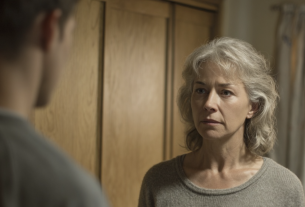— And what is this?
Igor carelessly tossed a pitiful, crumpled scrap of paper onto the kitchen table in front of Sveta. A receipt from a cosmetics store. He held it between two fingers, as if he were disgusted to touch the evidence of a monstrous crime. His voice was calm, even tired, which infuriated far more than any shouting. It was the tone of an investigator who’s listening for the hundredth time to the clumsy lies of an obvious culprit.
— It’s lipstick, — Sveta replied without lifting her eyes from her cup of cooling tea. She didn’t even glance at the receipt. She knew it by heart. 540 rubles. The crime of the century.
— I’m not asking what it is. I’m asking why, — he leaned on the table, looming over her. — You’ve got a whole makeup bag of lipsticks. We have a mortgage. We have expenses for the kids. And you’re buying some nonsense again. Every week it’s some new trinket. You just don’t know how to control yourself.
He spoke slowly, hammering in each word like a nail. He reveled in his role as the thrifty master of the house, the guardian of the family hearth, forced to fight the mindless female urge to squander. He didn’t notice—or didn’t want to notice—his new phone for sixty thousand rubles, bought last week because “the old one started lagging.” He forgot about the three thousand he left at the bar with friends last Friday because “you’ve got to relax sometimes.” Those were necessary, justified expenses. But her lipstick for 540 rubles was a hole in their family ship, which he, the gallant captain, was obliged to plug.
Sveta slowly raised her eyes to him. There was neither hurt nor anger in them. Only cold steel polished to a shine. That look made him falter for a second. He expected excuses, an argument—anything but this dead emptiness.
— You think I’m a spendthrift? Excellent. Starting today, we have separate budgets, and we’ll see which of us runs out of money first.
Without waiting for his answer, she got up, took her bag from the chair and the car keys. Igor stared after her in astonishment, his mouth opening for some sarcastic remark—but nothing came. She just left. He smirked, shook his head, and sat in her place. Another scene. Give it an hour; she’ll come back and everything will be like before.
But she came back twenty minutes later. Silently, she walked into the kitchen and dumped a thick, tight stack of cash onto the table. Fresh, crisp bills that smelled of the ATM. Igor looked at the heap of cash in bewilderment. Meanwhile, Sveta pulled several ordinary envelopes out of a drawer and a black marker.
The ritual began. He watched her like an actress in some strange avant-garde theater. She moved with icy, almost surgical precision. She counted out the necessary amount and put it in the first envelope. The marker squeaked sharply. “UTILITIES.” She counted out more. Second envelope: “GROCERIES.” Third—“KIDS (school, activities).” She moved quickly, efficiently; her fingers flew, counting the bills. It was obvious all those figures had long lived in her head—she didn’t hesitate for a second. It was her silent, invisible work, which she was now bringing into the light for the first time.
When the obligatory expenses had been parceled out, a sizeable pile of money remained on the table—their combined salaries minus life. Without batting an eye, Sveta split it exactly in half. She didn’t look at him. She looked at the money as if it were the only living participant in the scene. Finally, she pushed one half of the stack toward him.
— Here. This is your personal money for the month, — she said in the same metallic voice. — Gas, lunches, beers with friends, your gadgets, your “relaxing”—all from here.
Then she gathered her half and put it into the last, blank envelope.
— And this is mine. Cosmetics, coffee with a friend, tights, my “trinkets”—from here. The joint budget no longer exists. We’ve got two private ones now. See you at the finish line, darling. Or at the ATM, when someone’s money runs out early.
She stood up and went to the bedroom, leaving him alone at the table. Igor looked at his stack of cash. He reached out and touched it. A condescending smile played on his face. What a performance. What absurdity. He was sure this game would be over in a week, when she came up short for some other nonsense. He didn’t yet realize the race had already begun, and he had started it with a huge handicap—against himself.
For the first few days, Igor treated what was happening like an overlong, poorly acted joke. With pointed nonchalance, he pulled money from his personal envelope for lunch at the pricey café near the office, ostentatiously leaving generous tips. In the evening, coming home, he might casually toss the receipt onto the kitchen table, his whole demeanor saying: look, I can afford this—your games don’t touch me. He waited for her to break. For her pathetic little envelope to run dry after buying household cleaners or unplanned children’s tights, and for her to come to him cap in hand.
Sveta seemed not to notice his displays. She switched into the new mode with the emotionless efficiency of a robot vacuum. In the morning, a thermos appeared in the kitchen, which she silently filled with coffee brewed at home. Next to the kids’ lunchboxes there was now her own. She stopped pulling into coffee shops, steered clear of stores; her spending shrank to an absolute, ruble-precise minimum. Igor observed all this with a scornful smirk. He told a colleague at work that his wife had started a “financial detox,” and they laughed about it together. To him, it was still her whim, her problem.
The first bell rang on Tuesday of the next week. They were driving to the mall to pick up their son from practice when the low-fuel light came on insistently on the dashboard. Igor, eyes on the road, said as usual:
— Sveta, spot me for gas or we won’t make it.
— You’ve got your own envelope. Gas is your expense this week; you’ve been driving around on your own errands the last three days.
He was taken aback for a second and even turned his head toward her. He had expected anything—reproach, an argument—but not this calm statement of fact.
— Come on, don’t start. It’s our car; we’re going to pick up our son right now.
— The car is shared. The gas in it is not. I used my share over the weekend when I took the kids to my mother’s.
She didn’t look at him. She looked out the window, her profile firm and flawless like on an old coin. Igor had to pull into a gas station and, with an unfamiliar, nasty feeling, count out bills from his already noticeably thinned envelope. The crackle of that money in the cashier’s hands sounded like mockery. It was his money. Not abstract digits in a joint account, but his personal, living cash he could have spent on a steak or a new game.
The real blow awaited him on Friday. The younger daughter brought home a notice from school—two thousand rubles were needed for a field trip to the planetarium. When Igor got home from work, he saw the slip on the table and waved it off out of habit:
— Pay it, if we have to.
Sveta, who was at that moment sorting groceries into bags—the cheapest hypermarket clear across town, where she went specifically to save—didn’t even turn around.
— The “Kids” envelope is on the table. Put your thousand in. I’ve already put mine.
Igor froze. This wasn’t about gas anymore. This was for real. He walked to the table and saw the slightly open envelope with a single thousand-ruble bill inside—Sveta’s. He was supposed to take his own envelope, open it, pull out his thousand, and lay it beside hers. That simple physical action suddenly felt humiliating. He had to give up his money. Not for beer, not for entertainment, but for what had always merely been a line item somewhere out there in the fog of the joint budget. He yanked a bill from his stack and almost threw it into the kids’ envelope.
— Satisfied? — he hissed through his teeth.
Sveta finally turned. She looked at him long and searchingly, then at the envelope, then at him again.
— This is only the beginning, — she said quietly. — The race goes on.
Igor said nothing. He left the room in silence, feeling a dull, helpless irritation boiling up inside. The condescending smile had vanished for good. This was no longer a game. It was war. And he was beginning to understand he was losing it on his own turf.
By the third week of the experiment, the air in the apartment had thickened. It became viscous, like tar, and every breath took effort. Igor’s scornful smirk had long since evaporated, replaced by the look of a cornered animal. His envelope, once plump and reassuring, had shriveled into a thin, pitiful sleeve with a few crumpled bills rolling around inside. The realization that he was losing in the very game he had provoked didn’t just anger him—it burned him from within, reducing his pride to ash. He, so clever, calculating, successful, was being beaten by simple female stubbornness. And so he shifted from passive defense to active attack. His tactic became scorched earth.
The first strike was at her small, personal joys. Having saved on lunches, Sveta allowed herself to buy a small piece of pricey blue cheese and a jar of olives—her tiny, private celebration in the midst of total economizing. She looked forward to sitting down with a book that evening after putting the kids to bed and savoring the taste. When she returned from a walk with her daughter, she found an empty cheese wrapper on the table and a jar with a few sad inches of brine. Igor was in the living room watching football.
— Did you see my cheese? — she asked, standing in the doorway. Her voice was even, but a string stretched to its limit was already humming in it.
— Oh, that stinky stuff? Ate it with beer, — he didn’t even turn his head. — Why, was it special? It was in the common fridge. Or do we label the shelves now?
He hit the mark. He knew she wouldn’t stoop to dividing up the refrigerator. He used their shared territory as a weapon against her. Sveta said nothing. She quietly threw away the wrapper and the jar, but inside something clenched into an icy lump. This wasn’t just eaten food. It was a deliberate, conscious incursion. He was destroying the little she allowed herself with her saved money to prove that her personal space didn’t exist.
He delivered the main blow a few days later. Their son was doing homework on his tablet at the kitchen table. Igor walked by with a cup of coffee. His movement was deliberately awkward, a bit too theatrical. He caught the chair leg, flailed his arms, and the hot coffee flew straight onto the tablet’s screen. A short sizzle, a flash—and the screen went dark for good. The boy cried out in fright.
— Damn, what a klutz I am! — Igor exclaimed, setting the empty cup on the table. His voice held just enough regret to be plausible, but his eyes, which met Sveta’s for a split second, glinted with gloating triumph.
— Dad, you broke my tablet! — their son’s voice quivered with tears.
— It’s okay, buddy, we’ll fix it, — Igor said soothingly, turning to Sveta. — Well, that’s unfortunate. Let’s chip in for the repair from the kids’ envelope. There should be money there.
There it was—his plan in all its ugly glory. The “Kids” envelope covered planned expenses. Repairing an expensive gadget would blow a huge hole in it, if not empty it completely. He knew Sveta wouldn’t leave their son without a tablet he needed for school. He was cornering her, forcing her to spend the joint, strictly limited money on the consequences of his “clumsiness.”
Sveta was silent for a long time, staring at the blackened screen. She saw it all: his phony remorse, his true aim. She could have started shouting, accusing him, but she understood the utter pointlessness of that. He would simply say, “What, you think I did it on purpose?” and she would look hysterical. She walked over to the table, picked up the dead tablet, turned it over in her hands, and put it back down.
— Don’t. I’ll take care of it.
That evening she came back with a new tablet. Not as expensive as the old one, but fully functional. She handed it to their son without a word. Igor, watching the scene from the living room, couldn’t help himself.
— Where’d you get the money? Snuck it out of the kids’ envelope?
Sveta slowly turned to him. Her face was like a mask. She went to the dresser, took out her personal envelope, and shook its contents onto the table. It was empty. Completely.
— I spent mine, — she enunciated. — All of it. Down to the last kopeck. I hope you’re pleased with your coffee.
There was no metal left in her voice. There was ice. Absolute zero, at which all life freezes. She hadn’t surrendered; she had accepted his rules and made her move in this cruel game. She sacrificed her financial independence to show him he wouldn’t break her. Her resolve, tempered by his petty and large-scale sabotage, had turned into something else. It was no longer hurt or anger. It was cold, calculating hatred. And now she waited. Waited for his skinny envelope to breathe its last, so she could deliver the answering, crushing blow.
A week before payday, Igor’s money was gone. Not just dwindled—gone, evaporated, leaving behind only a bitter bewilderment and an empty, humiliatingly light envelope. He’d spent the last few days in strictest austerity mode, but his habits, ingrained deep, proved stronger. Lunch from the cafeteria instead of the café still cost money. Gas filled to the bare minimum still had to be paid for. His world, built on easy, unnoticeable spending from the common pot, collapsed, leaving him penniless in the middle of his own home.
Silence became a weapon. They moved across the same territory like two enemy spies, tracking each other’s every step, without direct contact. Sveta was the embodiment of icy composure. She had won. Her personal envelope was empty too, but she had sacrificed it deliberately, turning her financial capitulation into a moral victory. She had shown she could withstand any of his blows. Now she merely waited. And her waiting was scarier than any quarrel.
The denouement came on Thursday evening. Igor’s phone vibrated in his pocket. He saw his sister’s name and stepped out onto the balcony. The conversation was brief. He came back in gray-faced and drawn. He stood in the middle of the kitchen a long time, staring at one spot. Sveta was washing dishes, her back straight and tense. She felt his gaze but didn’t turn. At last, he couldn’t stand it.
— I need to go to my mother right now. She’s unwell—she fell, something’s wrong with her leg.
He said it as if stating an immutable fact, not open to discussion. He wasn’t asking. He was presenting a fait accompli, expecting ancient family solidarity to kick in automatically. Sveta slowly turned off the tap. She wiped her hands on the towel. Only then did she slowly turn to him.
— And?
That short, indifferent word hit him like a slap. He had expected questions, sympathy—anything but this.
— What do you mean, “and”? I need money for a ticket. And a little to take with me. I have to be there tomorrow.
He stared straight at her, trying to overpower her with his gaze, with his manly rightness, with the sanctity of a son’s duty. But her eyes were like two dull pieces of glass. Nothing reflected in them.
— Your envelope is empty, — she stated. — Mine too.
— I’m not talking about personal money! — the first notes of a crack crept into his voice. — We’ve got joint funds! Take it from there! This is an emergency—our family!
Sveta silently went to the dresser where the three cherished envelopes lay. Her movements were slow, ritual. She picked up the first, labeled “Utilities,” and turned it in her hands.
— This is for the apartment and the internet. A train ticket to your mother isn’t a utility.
She set it back and took the next one—“Groceries.”
— This is for food for us and the kids until the end of the month. Your trip is not a food item.
She put that one aside too. She picked up the last—“Kids.”
— This pays for school and activities. Your mother, with all due respect, is not our child. Her health does not fall under this budget line.
She neatly stacked the envelopes and looked at him. And in that moment Igor understood. He hadn’t lost money. He had lost everything.
— You… you’re serious? — he croaked. — My mother… and you… you’re counting money in envelopes?
And then Sveta spoke. Her voice was quiet and even, without the slightest hint of emotion—and all the scarier for it.
— Yes. I count money. Just as you counted every kopeck on the receipt for my lipstick. Your mother is your personal expense. Just like your beers with friends, your lunches in restaurants, and your new phone case. You spent your ticket to see her two weeks ago—you just smeared it across your bar tabs. You ate the money for her medicine in that steak you sent me a photo of to show how good your life is. You burned your filial duty with the gas you wasted driving aimlessly around town. And then you smashed it against our son’s tablet screen, just to prove you’re the boss.
She stepped toward him. The emptiness was gone from her eyes. In its place burned a cold, white fire of absolute hatred.
— You don’t have money not because I won’t give it to you. You don’t have money because you spent it. On yourself. Like always. You burned every bridge yourself. And now you’re surprised you can’t get to the other side. Walk.
She turned and went to the bedroom. She didn’t slam the door. She just left. And Igor was left standing in the middle of the kitchen. He looked at the three tidy envelopes on the dresser. They were not just paper with money inside. They were three tombstones on the grave of their family. And he had just realized that he was buried alive beneath them.



